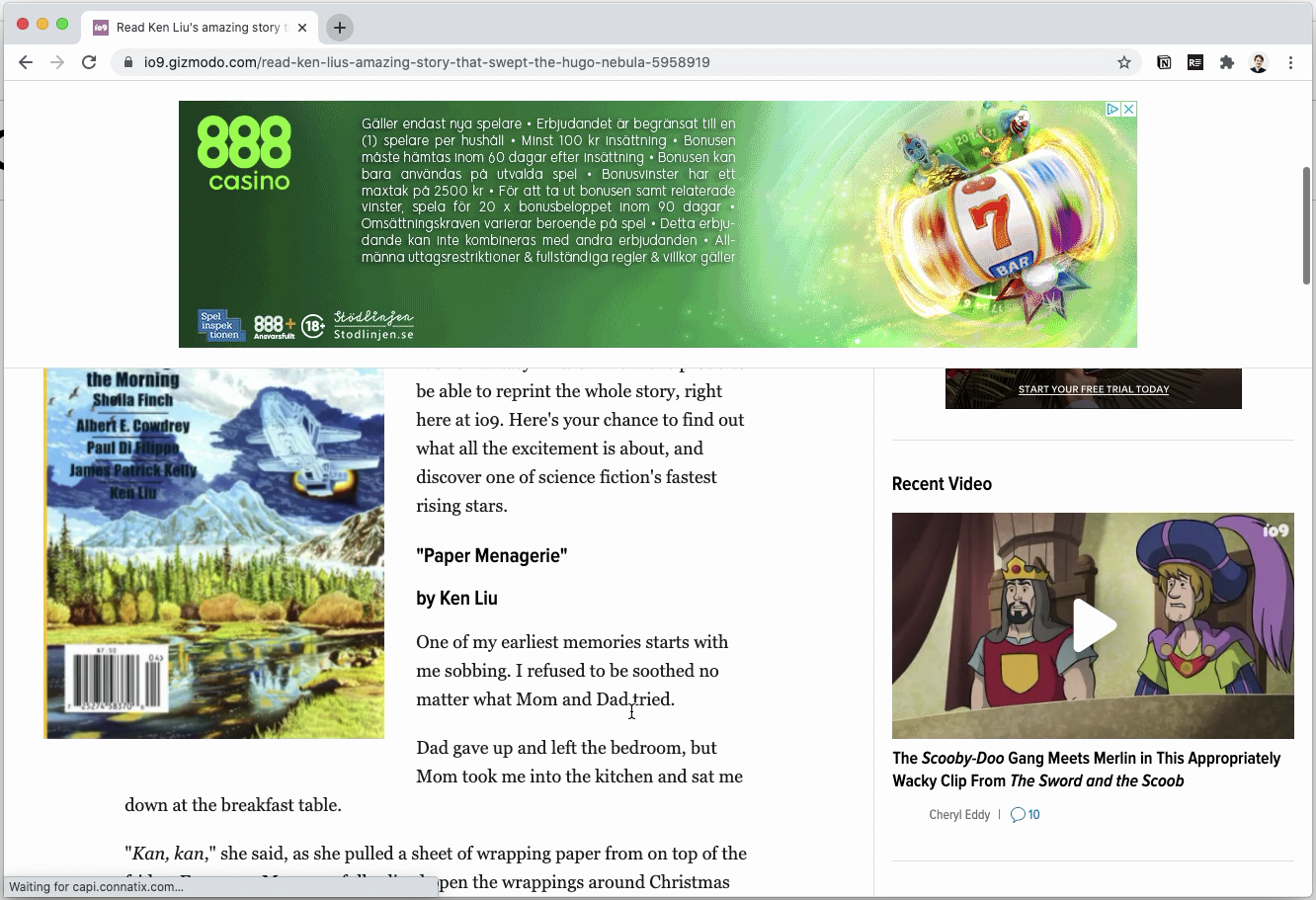Why I Joined Readup
Hello readers! My name is Thor, now officially the third employee at Readup. Together with Bill and Jeff, I’m working daily to build and grow the world’s best reading app.
Like many readers, I often leave crumbs of my identity in my Readup posts: you may have found that I’m a Belgian living in the European north, a (humane) tech aficionado, elaborate comment writer, and generally interested in an ever-increasing variety of articles. That last interest wasn’t always there: it’s something that Readup evoked in me.

I also happen to like running (mostly 1 miles), cycling (the commuting kind, and the week-long touring kind), sauna (very hot & Finnish), and the occasional beer (every other one non-alcoholic). But that’s not what I’m here to write about. In what follows I want to tell you how I joined Readup, why I did so, and why I believe the world needs Readup. Because it truly does.
Readup is technology that respects and enriches humans. To Readup, I personally owe the pleasure of online reading. And as I am joining this company, Readup is on a path to a wild and bright future that I invite you to join.
My Readup Story: Humane Tech
My Readup story began before Readup. I’d been a techie throughout my teenage years, so starting a career in software development & design followed naturally. In Computer Science grad school however, I became disillusioned with the tech world outside my coursework. What was I working towards?
Facebook, Instagram and others had morphed from being an exciting new plane of connection into largely time-draining pools of meaninglessness, capitalizing on attention without much afterthought. I realized that gazing daily at the lunch of an acquaintance vacationing halfway around the globe was not the most valuable use of my time, and yet, tech’s rising giants kept finding ways to fish for more of my engagement and more of my attention.
I was not alone in this feeling. Tristan Harris and Aza Raskin founded the Time Well Spent movement (now the CHT, Center for Humane Tech), and by religiously following their activities, podcasts and attending conference talks, I learned more about the global issues exacerbated by the attention economy: social injustice, loneliness, and more recently, misinformation.
The Center brought a hopeful message. With exciting design ideas and inspirational essays, they helped me envision a more humane internet - one that tips the scale towards adding value with tech, rather than extracting value from people in order to enrich advertisers.
I devoured everything new in the space. I installed attention-saving tools on my devices - Siempo on my Android phone, and Nudge in my browser. I personally aimed to create meaningful digital products and services for people. In 2017, during a gap year (before starting my master’s) I contributed to a social app for care homes in Belgium, soulcenter.be.
Life went on. I got my master’s degree, and a real humane tech revolution was still yet to begin. Today, despite their merits, Facebook, Google and Twitter still primarily try to make you watch as many ads as possible. And there are still no alternatives at scale that fully respect human limits and intentions.
Meanwhile, the CHT has done an increasingly good job of popularizing the problems of the attention economy. In 2020, they released The Social Dilemma on Netflix. It’s an excellent film, but it doesn’t actually make the internet more humane. That’s the hardest part! Even the venerated writer Yuval Noah Harari pointed it out as critical lesson for the 21 century: big tech’s business models need to change in order to escape this vicious circle. With grassroots humane tech tools struggling for traction, the movement is in a dire spot.
Then Readup came along. I made an account in 2019, following a reference in the Humane Tech Community forums. Readup wasn’t yet the business it is today, but it already was a special corner of the internet: a social reading community that cared deeply about the value of focused reading, supported by tech that aimed to genuinely improve reader’s lives.
I started using Readup for its minimalist reader mode. It made online reading a relaxing and rewarding activity. I stayed on, because I quickly noticed that the articles shared on Readup were top-notch. I experienced the welcoming and thoughtful community of engaged readers, who I started knowing by their reader names. Readup motivated me to finish good articles, without pushing me to read more than I wanted. This stuff was humane tech! And that is where our long-term relationship began.
Discovering Reading
I wasn’t really a reader before Readup. Since the end of 2019, Readup added this vital new hobby to my days.
I’ve always been a casual reader of books. But when it came to texts of shorter form (news sites or articles) I’d only really read something when I was actively researching a topic. Or when my dad left a magazine on the kitchen table. Throughout most of 2019, I maybe read about five articles per month. If I read them at all.

Enter Readup. Readup’s community recommendations consistently piqued my interest. As a result, I started reading more, and more deeply. Since I joined, I’ve been enjoying at least twenty insightful articles per month, often long-form pieces that take 20 minutes or more to read. This happened naturally, just by being on Readup.
I’ve come to appreciate deep reading of online articles. The diversity of articles on Readup satisfies my curiosity, helps me gain knowledge, and inspires me. It really feels like a refuge from the flickering, two-seconds-per-piece attention timespan of social media feeds. I don’t think the big social platforms are all evil, but now I find them to be exhausting.
Reading on Readup, instead, is Time Well Spent. I laugh with absurd stories like “The Boyfriend Identity”, and I get educated on topics as diverse as African American Vernacular English and the psychology of money.
Early during the pandemic, I had the chance to reflect on the infamous Swedish approach and what influenced it culturally. I also got a deeper background understanding of the history of flu epidemics through The Dead Zone by Malcom Gladwell published in 1997, the political disaster in India and recent mRNA vaccine breakthroughs.
Through the Readup community, I’ve been prickled by thoughtful debates about topics such as drug use and abuse, gender, and eating meat. These debates are considerate, because all participants are certified to have read the article that sparked the conversation. A breath of fresh air from the inflamed commentary that abounds on platforms like Twitter, YouTube and Reddit.
Through Readup’s Article of the Day recommendations, I got sensitized by stories about poverty, the difficulties of raising a child with disabilities, biases and discrimination. These stories have had an effect on my daily life and how I view the world.
Sources matter to me, but not in the same way that they used to. Readup helped me discover great writing in established publications like The New Yorker and The Atlantic, but also articles from countless independent writers like Tim Urban (from Wait But Why), Medium and self-published Wordpress bloggers.
Readup helps to navigate this enormity of writing. It’s like a Spotify for reading: you can consume what you like already, get inspired by what friends are consuming, or let the algorithm guide you to new places.
Reading articles and short stories might not be for everyone, but I’ve come to love it. It now coexists in my life with reading books, listening to podcasts, and watching films and series. It’s an essential part of my information diet, and I want to help others experience that change too. I believe that so many people with an overexposure to Twitter would do well with a calm, digital reading environment that invites them to consume great content.
This environment is strangely absent today. So many online publications confirm it to me: reading on the internet is horribly broken. Which writer can truthfully say: “Yes, please add some flashy advertisements next to my article and in between my paragraphs! And while you’re at it, pop up a video or two as well”? Which publisher of serious articles can be proud of having to promote polarizing clickbait titles to get more ad views, shoving thirty tracking cookies onto site visitors? And which reader rationally thinks that ad-blocking is an economically healthy way to consume articles on internet?

This is the state of reading on the internet today. As with social media, the problem of the publishing industry is inextricably linked with a deadlocked business model. Readers expect easy, complete and cheap access to an overly-fragmented world of online writing. Writers want to get paid. And no one connects them directly. Readup can, because Readup changes the business model.
Advancing Readup
Like every business, Readup is a continuous work-in-progress. It is complex, incomplete and wildly ambitious, but at its core, it is already beautifully functional. Working together with Bill, Jeff and future colleagues, I aim to grow Readup into the global home for online reading that it is destined to be - deliberately, one piece at at time.
Next up we’re launching a crucially simplified user experience. In a matter of days, we’re shipping a Windows desktop app that will live next to our existing Mac app, and an Android app will follow soon after. We’re putting the essence of Readup up front: Readup is the world’s best cross-platform reading app. It’s a separate environment where you can do your reading in peace, and in good company. Browsers still help you find articles, but reading happens on Readup at your own convenience.
We will always stay true to our core value: respect the readers. We’re always listening to feedback from our community, so please don’t hesitate to reach us at support@readup.com or message me personally at thor@readup.com whenever you have ideas, comments or thoughts.
The writing is on the wall. Readers and potential readers need Readup to reconnect with deep reading, with inspiring and challenging thoughts. Independent writers need Readup to build a sustainable income, automatically. The journalism industry needs Readup to absolve itself from a dwindling traditional reading market and sketchy clickbait.
On a recent phone call, a friend of mine said, “Readup is on the right side of history.” I agree. And I’m thrilled and honoured that I can contribute to shape that history!
If you’re not on Readup yet, get the app!